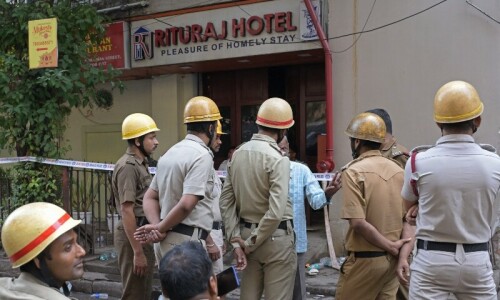ISLAMABAD: The Islamabad High Court (IHC) has observed that the National Database and Registration Authority (Nadra) doesn’t have the power to render a citizen stateless by cancelling his/her Computerised National Identity Card (CNIC) on the basis of intelligence report.
Chief Justice Athar Minallah issued a detailed order on 11 identical petitions filed against cancellation of CNICs and directed Nadra to restore all the cards.
The petitioners in the case are former senator Hafiz Hamdullah and others.
The petitioners are aggrieved because their registration as citizens of the Islamic Republic of Pakistan has either been suspended or cancelled/withdrawn.
All the petitioners have said that Nadra had either blocked or cancelled their respective CNICs on the sole ground that they were not citizens of Pakistan.
Court notes there is nothing on record to show how Nadra or the intelligence agency concerned concluded that the petitioners were not Pakistani citizens
The counsel for the petitioners have argued that citizenship is the most valuable human right and a person cannot be made stateless in an arbitrary manner; no power vests in Nadra to adjudicate on the question of citizenship; the registration of a person under the Ordinance of 2000 is affirmation of one’s citizenship and it cannot be suspended, let alone cancelled, in a perfunctory manner.
Nadra’s counsel on the other hand has contended that the authority is empowered under section 18 of the Ordinance of 2000 to cancel, impound or confiscate cards and that the procedure for doing so has also been prescribed therein.
The court noted that there was nothing on record to show how the Nadra or the concerned intelligence agency had concluded that the petitioners were not citizens of Pakistan.
“The authority nor the intelligence agencies are competent to determine the question of citizenship of a person. The suspension of a duly issued CNIC or cancellation thereof has a profound and grave consequence because it virtually brings the life of an affected person to a halt and the latter, by implication, is denied the exercise of fundamental rights guaranteed under the Constitution of the Islamic Republic of Pakistan, 1973,” the order said, adding that such a person loses the right of employment, access to his or her own bank accounts, the right to engage in trade, business or profession. Moreover, access to education, health, etc is denied. The family members are also equally affected. In a nutshell, the right to life guaranteed under Article 9 is virtually taken away.”
“This court has consistently observed that the authority is bereft of jurisdiction to adjudicate upon a question which involves the determination of the status of a person as a citizen of Pakistan and that too, on the basis of reports received from intelligence agencies which are under the control of the government,” the order observed.
Once a CNIC has been issued then the incorporated particulars can only be changed, modified or altered in accordance with the manner prescribed under rule 13 of the Registration Rules of 2002. The said rule does not entitle a third party to have the particulars changed. Nonetheless, changes or modifications can be made in execution of a decree or order passed by a competent court.
Likewise, a card can be blocked pursuant to an order by a competent court, e.g. in the case of a person declared as an absconder under the law.
“In a nutshell, citizenship is the sole and effective bond between a State and a human which enables the latter to enjoy all the rights guaranteed under the Constitution,” Justice Minallah noted.
In case of Hamdullah, the Pakistan Electronic Media Regulatory Authority also barred his appearance on television channels.
IHC observed: “TV channels have been restrained from “inviting and projecting the petitioner in programs/talk shows, news, etc,” was an obvious misuse of authority vested under the Pakistan Electronic Media Regulatory Authority Ordinance, 2002. It was issued in derogation of the rights guaranteed under Articles 19 and 19-A of the Constitution.”
Published in Dawn, May 23rd, 2021















































